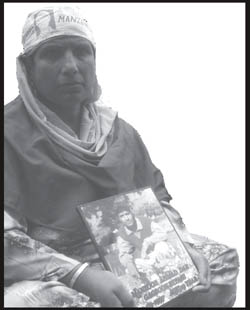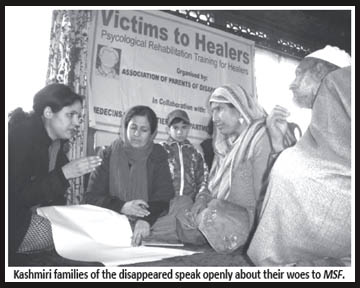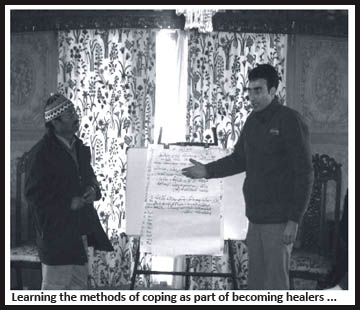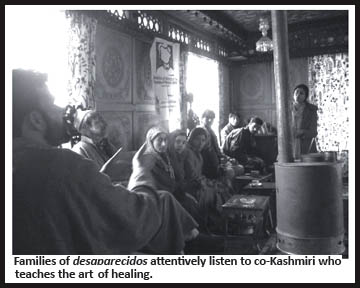 The issue of enforced or involuntary disappearance (EID) has left many
families in the state of melancholy. The families whose dear ones were
subjected to this cruel and inhuman treatment suffer in various ways. The
victims’ fathers, mothers, brothers, sisters, half widows and children
start their day with a dream for the return of their disappeared loved
ones but their evenings end up in despair and desolation. If their agony
and depression are not healed, it may lead them to an untreatable malady.
The issue of enforced or involuntary disappearance (EID) has left many
families in the state of melancholy. The families whose dear ones were
subjected to this cruel and inhuman treatment suffer in various ways. The
victims’ fathers, mothers, brothers, sisters, half widows and children
start their day with a dream for the return of their disappeared loved
ones but their evenings end up in despair and desolation. If their agony
and depression are not healed, it may lead them to an untreatable malady.
The phenomenon of disappearance could cause incessant torture to the lives
of family members of the disappeared. The kith and kin of disappeared
undergo economic, social and other problems. Such a tragedy traumatizes
the mind and the body. The consequent stress overwhelms a person and
causes lasting psychological effects. In the context of Jammu and Kashmir,
the half widows become the direct targets of disappearances. They have no
source to sustain and to nourish their children. They undergo many
hardships and come across many social and economic problems.
The victims’ families suffer from various psychological
disorders like post traumatic stress disorder (PTSD), depression, mental
and traumatic disorders and cardiac attacks. In medical terminology, a
trauma is simply a wound or injury that happens suddenly or violently by
some irrevocable loss. Since the beginning of the conflict in Kashmir,
mental trauma is common among people particularly with the relatives of
disappeared persons.
The Association of Parents of Disappeared Persons (APDP),
in cooperation with the Asian Federation Against Involuntary
Disappearances (AFAD) facilitates workshops, a support system that
provides the families of the disappeared a common way of adapting to their
trauma, i.e. sharing stories and experiences. In fact, these events
provide the victims’ families the means to handle their sufferings and
trauma.
 To avert more tragedies to such victims, the APDP, in cooperation with the
AFAD organizes rehabilitation cum therapeutic programs so that such
efforts would lend a hand to the suffering family members and to purge
their haunting reminiscences. Such psycho-moral rehabilitation workshops
have been organized during these last three years and had been proven
helpful in healing the depressed and dejected victims of enforced or
involuntary disappearance.
To avert more tragedies to such victims, the APDP, in cooperation with the
AFAD organizes rehabilitation cum therapeutic programs so that such
efforts would lend a hand to the suffering family members and to purge
their haunting reminiscences. Such psycho-moral rehabilitation workshops
have been organized during these last three years and had been proven
helpful in healing the depressed and dejected victims of enforced or
involuntary disappearance.
To sustain such efforts, on 28-29 December 2008, the
APDP organized a workshop with the support of Medicin Sans Frontiers (MSF),
an international organization working on mental health in the state of
Jammu and Kashmir and the Doctors from the Department of Psychiatry. The
executive members of APDP and some other victims of enforced or
involuntary disappearance took part in this program.
The Medicin Sans Frontiers (MSF) team of five persons
was led by its Health Officer, Ms. Judi. The team of doctors from the
Department of Psychiatry was led by renowned Clinical Psychologist of
Kashmir, Doctor Muzaffar Ahmed Khan who helped the victims’ families
understand relaxation and rehabilitation techniques. All these experts
gave various suggestions and pieces of advice to the participants so that
they could help other victims of the same tragedy to overcome their
traumas and move on with life.
Day 1
The MSF Health Officer, Miss Judi, commenced the first session of the
program. While encouraging victims, she said that MSF professionals could
also learn from those who are victimized and who are suffering and she
considered them as the real experts. She commended that the relatives of
disappeared have associated themselves in the APDP to fight for justice
with courage and strength and to ascertain the whereabouts of their dear
ones, whose lives have been stolen.
While speaking to the members of the APDP, she said,
“It is really great you help other people of the same suffering. You
listen to the stories of others and allow them to express their feelings
and offer them support. You can even share experiences and hopes with
other victims of disappearance. You can suggest to them to do things that
you did to cope with the depression and other problems.”
“The tragedy of disappearance is so worse that
sometimes family members of the victims deny that he or she met such an
incident in the family. It is like a bad dream and the victim gets angry
over other family members or even sometimes reproves God. The family
member of the disappeared feels guilty and thinks that the incident could
have been prevented. In such a situation, a family member of a disappeared
experiences depression, lack of zest in life, intense sadness, etc. To
respond to the situation, professional help is needed. Counselors help
victims in overcoming these problems,” added Ms Judi.
Impact of the Previous Rehabilitation Program
Nevertheless, the counselors discussed about previous workshops and
invited participants’ opinions about these. Many trained victims expressed
their experiences and wishes.
Mohammad Yaseen Malik, an executive member of the APDP said, “the victims
not only suffer from depression, they also get other disorders which could
not be cured by counseling only. There is also a need for medical
diagnosis for such victims. We should be taught with more skills so that
we would become proficient in supporting others.”
Ghulam Nabi Mir of Uri and Ms. Shaheena requested that
such workshops be organized twice in a year so that there would be a
constant process of helping victims overcome their poignant trauma. Both
articulated that the previous workshop proved noteworthy for the trauma
ridden families of the disappeared.
Another young member of APDP, Shabnam Jan, whose brother involuntarily
disappeared, expressed: “Last year’s rehabilitation program had trained
and encouraged me a lot. My father was very much distressed but I guided
him with some methods, which were taught to us by psychotherapists last
year. The techniques in fact helped him to a great extent to come out of
distress and now he feels better.”
Day 1 - Second Session
After taking note of past experiences of participants, the
counselor divided all of them into four groups. Each group was given the
task to make a note of their day-today problems and one professional
assisted every group. Finally, the groups concluded the task by pointing
out the disorders and ailments which came across their lives by the trauma
of the disappearance of their loved ones.
After taking note of ailments, Mr. Bahjad and Ms. Iffat,
both counselors with MSF, discussed about symptoms of mental disorders and
methods of coping. These subjects were detailed to enhance the expertise
of participants.
Symptoms and Coping Methods of Mental Flux
The counselor narrated that there are four categories of symptoms
among the mentally unsteady and traumatic patients, and these are; (1)
physical symptoms (2) emotional symptoms (3) cognitive symptoms (4)
behavioral symptoms. However, there are two kinds of coping i.e. positive
coping and negative coping.
Physical Symptoms
These symptoms are indicated by different pressures over the victims
and such pressures affect the health victims and they usually get
disorders like, headache, heartache, trembling, etc.
Emotional Symptoms
These symptoms are known when a family member of a disappeared weeps
and often remains absent-minded and unconscious. In such conditions, a
victim also considers that his or her life is full of sorrows.
Cognitive Symptoms
These symptoms are understood when a victim suffers from forgetfulness
and often thinks negatively. Under these circumstances, a family member of
a disappeared also feels guilty conscious as if he is responsible
for the untoward happening.
Behavioral Symptoms
During the symptoms, the victim’s behaviors changes and s/he treats
everyone differently. A victim in such a situation expresses anger and
resentment on trivial matters. Generally, this person prefers solitude and
becomes intolerant.
Methods of Coping
Mr. Bahjad and Ms. Iffat, while deliberating about the coping methods,
said that before counseling a victim, we must keep three things in mind:
individualism, psycho-education of a person and body-mind relationship.
Before counseling a patient or victim, we must ensure the following
things:
1. Active and patient listening to the victim;
2. Providing the victim with a chance to speak out at
ease;
3. Assuring confidentiality to the victim and understanding and
sympathizing with his or her problem;
4. Understanding the victim’s problems and seeking and providing available
remedies;
5. Suggesting to the victims and patients the following:
a. To keep themselves engaged in work and avoid
solitude;
b. To make regular visits to their relatives and friends in order to avert
their grief;
c. To take part in sports and other games which can also be helpful to
mitigate the stress level;
d. To visit a professional psychiatrist or counselor who could give proper
attention to him or her and can prescribe medical help after proper
diagnosis. This is applicable if the cause of the problem is not
understood;
e. To think positively and to create power of tolerance;
f. To sit together with other family members and share ideas and
experience with them;
g. To take efforts to understand the results of good thinking and bad
thinking and advice for good thinking.
The above techniques and suggestions were taught to the
participants so that they can heal their corresponding co- victims and
other persons of same disorders.

Day 2
Dr. Muzaffar Khan, Consultant Clinical Psychologist of Kashmir led the
next day session. He started it with an interaction with participants and
listened to their experiences. The participants, while sharing their
problems, informed Dr. Muzaffar about various problems they encountered
while counseling their counterparts.
 Dr. Muzaffar said, “There are only 18 psychiatrists in Kashmir and
patients of psychological disorders are less aware about the presence of
such Khurram Parvez, an undaunted champion for peace, defends human rights
in war-torn Kashmir, encourages young people to pursue peaceful approaches
to change and advocates for families affected by the violence. While he
was a university student in Kashmir, Khurram witnessed the distress and
hostility of students accustomed to a lifetime of violence. He was a
recipient of the 2004 Reebok Human Rights Award. He works for the AFAD as
an alternate Council member representing the APDP. experts in their areas.
Whenever a victim suffers from a psychological ailment, he or she resorts
to a hospital. The victim does not get proper treatment. Then he or she
visits magicians to get rid of the problem but nothing concrete happens. A
patient of mental trauma needs counseling as well as medicines.”
Dr. Muzaffar said, “There are only 18 psychiatrists in Kashmir and
patients of psychological disorders are less aware about the presence of
such Khurram Parvez, an undaunted champion for peace, defends human rights
in war-torn Kashmir, encourages young people to pursue peaceful approaches
to change and advocates for families affected by the violence. While he
was a university student in Kashmir, Khurram witnessed the distress and
hostility of students accustomed to a lifetime of violence. He was a
recipient of the 2004 Reebok Human Rights Award. He works for the AFAD as
an alternate Council member representing the APDP. experts in their areas.
Whenever a victim suffers from a psychological ailment, he or she resorts
to a hospital. The victim does not get proper treatment. Then he or she
visits magicians to get rid of the problem but nothing concrete happens. A
patient of mental trauma needs counseling as well as medicines.”
Responding to the queries of the APDP participants, he
added, “If you cannot persuade any victim or if a victim does not agree
with your suggestions, then contact any relative or friend of that person
and make them understand about the remedies available for the affected.”
Dr. Muzaffar stated that there are some elements in
society who exploit psychologically disturbed people. Such elements can
make an unsteady person a drug addict or even can use him for committing
criminal activities. So whenever a trained healer finds such kind of a
victim, suggest that a professional psychiatrist, who could help him
overcome the stress, be consulted.
Dr. Muzaffar taught the participants some relaxation
techniques and advised them to practice these techniques in their house.
He prescribed that the relaxation techniques can be of great help for the
mentally disturbed people.
The last session was carried out by Dr. Muzaffar and
his colleagues by practically teaching the participants various
therapeutic exercises, breathing exercises, etc. Eventually the session
was concluded with a relaxation practice. All the participants, including
professionals, underwent this activity. Dr. Muzaffar suggested that the
participants could be trained to use this technique to their counterparts
so that they can help them in overcoming their trauma and minimizing
stress.
____________________________
Khurram Parvez, an undaunted champion for peace, defends human
rights in war-torn Kashmir, encourages young people to pursue peaceful
approaches to change and advocates for families affected by the violence.
While he was a university student in Kashmir, Khurram witnessed the
distress and hostility of students accustomed to a lifetime of violence.
He was a recipient of the 2004 Reebok Human Rights Award. He works for the
AFAD as an alternate Council member representing the APDP.
 The issue of enforced or involuntary disappearance (EID) has left many
families in the state of melancholy. The families whose dear ones were
subjected to this cruel and inhuman treatment suffer in various ways. The
victims’ fathers, mothers, brothers, sisters, half widows and children
start their day with a dream for the return of their disappeared loved
ones but their evenings end up in despair and desolation. If their agony
and depression are not healed, it may lead them to an untreatable malady.
The issue of enforced or involuntary disappearance (EID) has left many
families in the state of melancholy. The families whose dear ones were
subjected to this cruel and inhuman treatment suffer in various ways. The
victims’ fathers, mothers, brothers, sisters, half widows and children
start their day with a dream for the return of their disappeared loved
ones but their evenings end up in despair and desolation. If their agony
and depression are not healed, it may lead them to an untreatable malady. To avert more tragedies to such victims, the APDP, in cooperation with the
AFAD organizes rehabilitation cum therapeutic programs so that such
efforts would lend a hand to the suffering family members and to purge
their haunting reminiscences. Such psycho-moral rehabilitation workshops
have been organized during these last three years and had been proven
helpful in healing the depressed and dejected victims of enforced or
involuntary disappearance.
To avert more tragedies to such victims, the APDP, in cooperation with the
AFAD organizes rehabilitation cum therapeutic programs so that such
efforts would lend a hand to the suffering family members and to purge
their haunting reminiscences. Such psycho-moral rehabilitation workshops
have been organized during these last three years and had been proven
helpful in healing the depressed and dejected victims of enforced or
involuntary disappearance.
 Dr. Muzaffar said, “There are only 18 psychiatrists in Kashmir and
patients of psychological disorders are less aware about the presence of
such Khurram Parvez, an undaunted champion for peace, defends human rights
in war-torn Kashmir, encourages young people to pursue peaceful approaches
to change and advocates for families affected by the violence. While he
was a university student in Kashmir, Khurram witnessed the distress and
hostility of students accustomed to a lifetime of violence. He was a
recipient of the 2004 Reebok Human Rights Award. He works for the AFAD as
an alternate Council member representing the APDP. experts in their areas.
Whenever a victim suffers from a psychological ailment, he or she resorts
to a hospital. The victim does not get proper treatment. Then he or she
visits magicians to get rid of the problem but nothing concrete happens. A
patient of mental trauma needs counseling as well as medicines.”
Dr. Muzaffar said, “There are only 18 psychiatrists in Kashmir and
patients of psychological disorders are less aware about the presence of
such Khurram Parvez, an undaunted champion for peace, defends human rights
in war-torn Kashmir, encourages young people to pursue peaceful approaches
to change and advocates for families affected by the violence. While he
was a university student in Kashmir, Khurram witnessed the distress and
hostility of students accustomed to a lifetime of violence. He was a
recipient of the 2004 Reebok Human Rights Award. He works for the AFAD as
an alternate Council member representing the APDP. experts in their areas.
Whenever a victim suffers from a psychological ailment, he or she resorts
to a hospital. The victim does not get proper treatment. Then he or she
visits magicians to get rid of the problem but nothing concrete happens. A
patient of mental trauma needs counseling as well as medicines.”